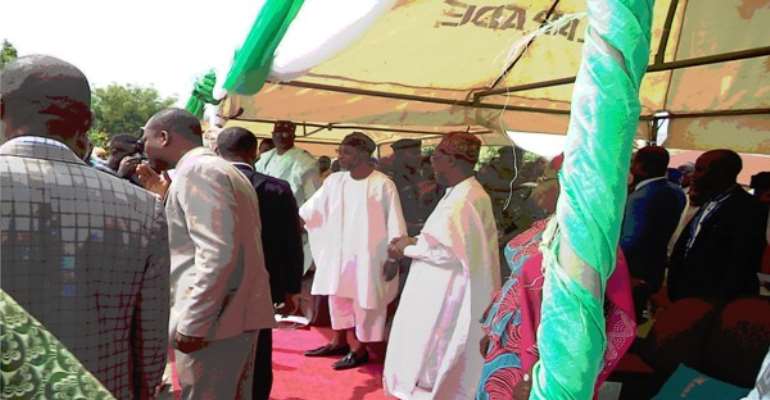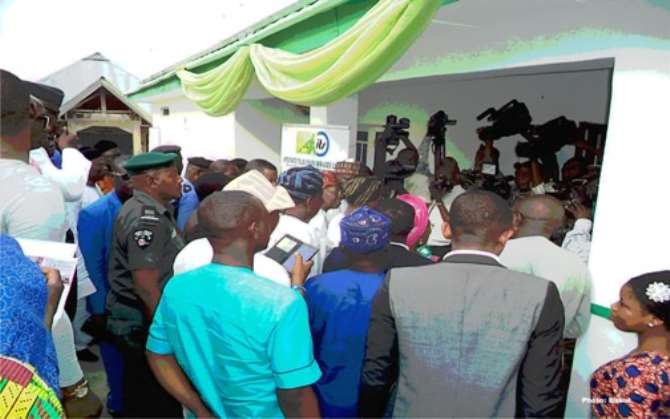Governor Aregbesola Applauds Federal Government Support For Take Off Of Digital Terrestial Television Project In Nigeria.

The official commissioning of Federal Government Digital Switch On(DSO) television broadcast pilot project, the sixth in the country and the first in the Southwest geo-political zone of Nigeria, took place in Osogbo, the state of Osun on Friday, 23rd February, 2018.
The state governor, His Excellency, Engineer Rauf Adesoji Aregbesola in his speech at the epoch making ceremony commended the Federal government for its support for the eventual take off of the DSO pilot project in the country after postponing the Analogue Switch Off(ASO) date on two occasions failing to meet the International Telecommunication Union(ITU) extended deadline date of June, 2017.
The global International Telecommunication Union of which Nigeria is a member, at their Geneva Switzerland conference in 2006 agreed that all member nations by 2015 must have officially completed migration from Analogue to Digital terrestial television broadcasting.
Engineer Aregbesola responding to welcome speeches made by all stakeholders in the project in Nigeria, thanked the Honorable Minister of Information and Culture, Alhaji Lai Mohammed and his digital television migration team for siting the Digital Switch Over(DSO) television broadcast pilot project in Osun state as a kind gesture of the Federal government as dividend of democracy for the people of the state.
He urged the people, stakeholders, professionals and youths of the state to avail themselves of the great opportunities associated with the new millennium scientific innovation in information and communication industry for the growth and development of the state and people.
The Governor noted that the Digital Terrestial Television technology transfer will create employment, improve our Education system, Entertain the people, enhance cultural, health, social and economic wellbeing of people in the state.
He however warned that program contents of television broadcast must teach morals and must importantly be void of abusive or hate speeches that can incite people to violence or bring about social, ethnic, or communal strife that could mar the unity and the peaceful co-existence of people not only in the state but in the country as a whole.
The DSO pilot project he stressed will involve the participation of foreign technical partners and a huge capital investment by the federal government. He urged the foreign technical partners to be faithful to their commitment and must not use Nigeria as a dumping ground for obsolete equipment. He assured the Minister, that Osun state government will assist and support in the production of quality, cheap and affordable Set-Top boxes by the manufacturing company attached to the state and whose factory is based in Ilesa.
The audience were educated on the fact that Digital migration will affect consumers who receive free to air television signals through television sets that generally depend on antenna for reception.
Consumers or people with analogue television sets, will however need the use of the Set-Top box to help enable their analogue television set receive Digital Broadcast. A Set-Top box is defined as a digital to analogue signal converter; it is a device that can be easily plugged to the television set to view programs.
Television sets connected to cables with service providers carrying terrestial signals do not need Set-Top boxes. Modern television sets with tuners also do not need Set-Top boxes. Many at the ceremony used the opportunity of the enlightenment talk to buy set-top boxes at a cheap rate of one thousand five hundred naira (#1 500.00).
Mallam I. M. Kawu, Director-General of Nigerian Broadcasting Corporation earlier in his welcome address indicated that digital map of the country for the success of the DSO project have been completed and commissioned. The two licensed distributor companies, the backbone of the DSO in Nigeria he said are: Integrated Television Service(ITS) Limited and Pinnacle company Limited.
After the launch in Osun state, the launch in Delta and Gombe states he said will complete the first phase of the regional launches around Nigeria. The list of states for the second phase of the launch in the country he noted have been compiled and will be made known very soon. The DSO television he said has more than thirty channels and will feature local, regional and national programs dedicated to the preservation and flowering of Nigerian culture and languages which will be beneficial to women, youths and children.
Globally, the daily life for people changed with the invention and commercialization of analogue television broadcast in 1941. Eighteen years after this great scientific feat, the technology first came to Africa with the establishment of the Western Nigerian Television(WNTV) station in Ibadan, the capital of the old Western region of Nigeria in 1959, then it was later established in Lagos the then federal capital and the three remaining regions of the country(North, Mid-West and East).
Television stations in the country known by the name: National Television Authority(NTA) were controlled by the Federal government and eventually in the event of military rule in the country when states were created, each state established, control and manage its own television station.
In 1992/1994 when the federal government deregulated television broadcasting, private television stations were set up in the country and this immensely brought growth to the nation’s television broadcast industry.
Today in the history of the country, the Digital television technology came six and a half decades after the advent of the analogue television. In the new millennium, because of its many users worldwide analogue television broadcasting system has reached its carrying capacity and this may bring about poor and limited service delivery to a large number of consumers.
Digital terrestial television broadcast and migration therefore will afford the television broadcast media great opportunity to connect isolated users in remote communities of the world and will remove the problems associated with analogue television transmitting in the efficient use of spectrum for extending wireless broadband communication which enables satellite navigation and monitoring of terrestrial signals.
Digital television system in broadcast media improves coverage for digital television transmission, ensures the availability for wireless broadband service, enhances sound and picture quality, enables more channels and provides users with undisturbed access to transmission.
In the twenty first century technology race, the transfer and adoption of the digital television technology by nations in Africa is commendable. The migration from analogue to digital television broadcast in Nigeria commenced with the federal government digital switch on pilot project launch in Jos, Plateau state, Abuja, Kaduna, Kwara, Enugu and the state of Osun.
In Africa, except for Ghana and Mauritius, a great number of other nations in the continent could not meet the ITU analogue switch off deadline date and all are working hard to effect migration to avoid sanction by ITU.
The cutting of tape at the commissioning of the ITS newly built signal distributor hall was performed by Governor Aregbesola accompanied by the Minister, Alhaji Lai Mohammed, Director General of Nigerian Broadcasting Corporation, Mallam I Modibbo Kawu, Eminent dignitaries, guests and representatives of the general public(Market women, Workers, Students, Academicians etc.) present at the occasion.
The ceremony took place at the NTA premises Oke-Pupa, Abere Osogbo in the state of Osun. Guests were entertained by an Osogbo based cultural group and many of the social elites amongst the Guests became feast for Journalists in their quest for interviews and photographs.. The Deputy Governor, Mrs. Grace Titilayo Laoye-Tomori and the Zonal Manager of Nigerian Television Authority, Osogbo, worked tirelessly for the success of the ceremony. The colourful ceremony was attended by top federal and state functionaries, Senators, Director – Generals, Directors, Chairmen, Stakeholders in the DSO project in Nigeria, Organizations, Politicians, Journalists and distinguished personalities in the television broadcast media, Guests from within and outside the state of Osun and the general public.

